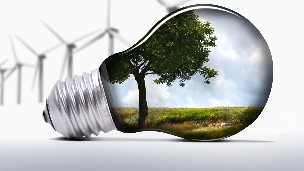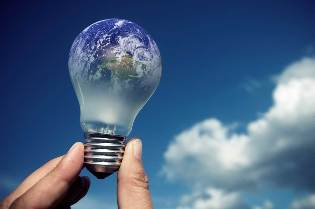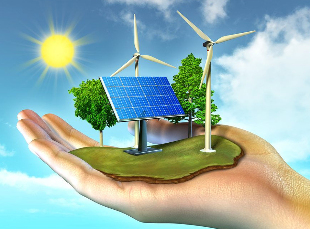Currently, energy conservation is one of priorities. This is due to lack of basic energy resources, the increasing cost of their production, and global environmental problems.

What is energy conservation?
Saving energy the efficient use of energy resources through the use of innovative solutions that are technically feasible, economically justified, and acceptable from environmental and social points of view, do not change a habitual way of life. This definition was formulated at the International energy conference.
Energy saving in every sphere is essentially reduced to reduce the useless loss of energy. Analysis of losses in production, distribution and consumption of electricity shows that most of the losses – up to 90% – are in terms of energy consumption, while transmission losses of electricity account for only 9-10%. Therefore, the main efforts on energy saving is concentrated in the area of energy consumption.
The main role in increasing the efficiency of energy use belongs to modern energy-saving technologies. Energy-saving technology new or advanced technological process, characterized by a higher efficiency of use of fuel and energy resources (FER).
Introduction of energy saving technologies in economic activity as businesses and individuals at the household level is an important step in solving many environmental problems – climate change, pollution (e.g., emissions from CHP), exhaustion of fossil resources, etc.
Usually companies implement the following types of technologies that provide significant energy saving effect:
- Common technology for many enterprises associated with energy use (motors with variable speed, heat exchangers, compressed air, lighting, steam, cooling, drying, etc.).
- More efficient energy production, including a modern boiler houses, heat and electricity, but also heat, cold, electricity; replace old industrial equipment with new, more efficient.
- Alternative sources of energy.
Power saving mode is particularly relevant for mechanisms that part-time work with reduced load – conveyors, pumps, fans, etc. There are many devices that allow to achieve reduction of losses when operating electrical equipment, including capacitor Bank and variable-frequency drives. Frequency variable drives with built-in features of power optimization flexible change of frequency of rotation depending on the actual load, which saves up to 30 to 50% of electricity consumed. This often does not require replacement of the standard motor, which is especially important when upgrading facilities. These energy saving drives and automation can be implemented on most industrial enterprises and the housing sector: from elevators and ventilation installations to enterprise automation.
Scientists have developed an installation at which part of the heat passing into the pipe after burning in the production of natural gas is used to generate additional energy capable of lighting five buildings of 16 floors.

Energy saving technologies in construction are complex, this includes wall insulation, energy efficient roofing, energy saving paint, glazing, economical heating and cooling surfaces.
One of the most common energy saving technologies with great potential for improvements in the construction of housing boiler. Modern technology can significantly reduce energy consumption, reduce maintenance costs, improve efficiency. In addition, the replacement of the boiler often allows companies to switch from polluting and expensive coal or fuel oil to cheaper and clean fuel, such as gas or wood pellets.
Also gives a great saving if, instead of separate Central heating units to accommodate individual heating unit, equipped with modern noiseless pumps, compact and efficient plastic heat exchanger.
At the organization of ventilation in the building is used system recovery (for recycling re-use) of heat of exhaust air and a variable flow ventilation units depending on the number of people in the building. These systems allow not to waste the heat generated by people, lighting, commercial and office equipment, and thereby reduce the consumption of heat from external source – heating system or boiler.
An example of homes that will allow the person to live in harmony with nature, at the same time not depriving yourself of the usual comfort, the so-called home zero energy (zero energy house) or passive house (passive house), grouped under the General term "energy efficient house".
"Energy efficient" would be a house in which is maintained a comfortable temperature in winter without heating system and in summer without using air conditioning system.
The house was energy efficient in its construction must be done the following:
- Application of modern thermal insulation of pipelines of heating and hot water.
- Individual source of heating and energy supply (individual boiler or cogeneration source of energy).
- Heat pumps that use ground heat, heat of exhaust ventilation air and heat the wastewater.
- Solar collectors to the hot water supply system and the cooling system of the room.
- Heating system in each apartment with heat meters and individual regulation of the thermal regime of the premises.
- A system of mechanical exhaust ventilation with individually adjustable and heat recovery of exhaust air.
- Each apartment has a controller that optimizes the heat consumption for heating and ventilation of the apartments.
- Walling with high thermal protection standards and heat-tolerance.
- The waste heat of solar radiation in the heat balance of a building based on the optimal choice of translucent enclosing structures.
- Devices that use scattered solar radiation to improve lighting and reduce energy consumption for lighting.
- Selection of designs shading devices according to the orientation and irradiance of fronts every season.
- Using heat from the return water of heating system for Underfloor heating in the bathrooms.
- System control the heat and power supply, microclimate of premises and engineering equipment of the building on the basis of mathematical model building as a single energy system.
There are other ways to optimize the use of electricity, not only in production but also in everyday life. Thus, the already long-known "smart" lighting system. Energy-saving effect based on the fact that the light automatically turns on when you need it. The switch has an optical sensor and a microphone. A day at high light levels, lighting is disabled. At dusk the activation of the microphone. If the radius of 5 m noise (e.g., footsteps or the sound of a door opening), the light automatically comes on and remains on until the person is in the room. Such lighting systems using energy saving lamps.
Led lamps allow you to achieve significant energy savings compared with traditional light sources incandescent lamps (80%) and fluorescent lamps (over 40%). These lamps can be used in the lighting of various objects: pedestrian underpasses and car parks, garden and Park lighting, street lighting, lighting in housing and emergency lighting.

There are promising energy conservation projects in the transport sector. American engineers came close to the production of passenger cars, equipped with attachments that convert exhaust heat into electricity. The generator, mounted on the silencer that converts heat exhaust into electricity, which can ensure the operation of climate control systems, music systems, etc.
German scientists develop highly efficient energy-saving devices required for vehicles with hybrid engines. The device works by using oil on the freeway and by electricity in town, thus using comparatively less energy.
In my house each user can save power by adhering to the following rules:
- Replace incandescent bulbs with modern energy-saving lamps.
- To turn off unused appliances (e.g., TV, VCR, stereo).
- On electric plates to use cookware with a bottom, which is equal to or slightly exceeds the diameter of the burner, do not use a pan with a curved bottom.
- Washable in the washing machine with a full load and select a wash cycle.
- Keep an electric kettle a boiler scale.
- Not much to dry clothes, it saves when Ironing.
- Frequently change bags to collect dust in cleaner.
- To put the refrigerator in the most cool place of kitchen.
- Use light curtains, Wallpaper.
- Frequently wash the window, on the window sills to put a small number of colors.
- Do not close the blackout curtains and radiators.
























